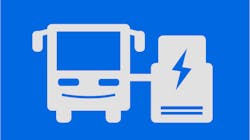Virginia allocates $12 million toward electric buses
The commonwealth of Virginia is allocating $12 million to three transit agencies to deploy electric transit buses. The funds consist of local, state and federal funds, as well as $9 million from Virginia's share of the Volkswagen Environmental Mitigation Trust (VW Trust).
“Electric buses are a key component of Virginia’s strategy to address the climate crisis, reduce air pollution in our communities, and drive innovation across the commonwealth,” said Virginia Gov. Ralph Northam. “We are demonstrating how entrepreneurs, government and industry partners are coming together to implement the best renewable energy technologies available and power the clean economy.”
In total, 17 electric buses and charging infrastructure will be deployed by local transit systems in Alexandria, Blacksburg and Hampton Roads. The $9 million from the VW Trust will be augmented by $3.5 million from the statewide transit capital program, as well as another $6.5 million in federal and local funds. This allocation is part of a commitment Virginia made last fall that $14 million, or 15 percent, of the VW Trust funding will be used for electric transit buses. The Virginia Department of Environmental Quality (DEQ) will make the remaining $5 million of the $14 million initial allocation available for electric transit buses for next year’s transit grant cycle, which will open on December 1, 2019.
Last week at its meeting in Richmond, the Commonwealth Transportation Board (CTB) approved the Fiscal Year 2020–2025 Six-Year Improvement Program, which allocates funding for the Virginia Department of Rail and Public Transportation (DRPT). DRPT is working closely with DEQ, the designated lead agency implementing Virginia’s VW Trust allocation, and the Virginia Department of General Services (DGS) on this important initiative to accelerate the transition to a cleaner transportation system for all.
Recipients of VW Trust and statewide transit capital funding include*:
- Alexandria (DASH): $5.1 million for six battery-electric transit buses and fast chargers
- Blacksburg Transit: $3.3 million for five battery-electric transit buses and fast chargers
- Hampton Roads Transit: $3.9 million for six battery-electric transit buses and fast chargers
* Funding amounts are approximate.
“This funding allows us to promote cutting carbon pollution across the country, invest in environmentally sustainable transportation in Alexandria and reduce DASH operational costs,” said DASH General Manager & CEO Josh Baker.
DASH and city of Alexandria staff have initiated the procurement process to advance the purchase of all six buses. DASH is now set to begin securing the necessary production to determine the delivery timeframe, which is expected to take approximately 12-18 months. Additional infrastructure improvements and utility upgrades at the DASH Facility will also be implemented by 2020 to support the operation of the new electric buses.
“It is our goal to be the first system in the commonwealth to put these buses on the road in revenue service,” said Baker.
Following a comprehensive review and analysis of all funding requests by DRPT and DEQ, these buses were identified for replacement using DRPT’s Making Efficient and Responsible Investments in Transit (MERIT) project prioritization process. Funding recipients must purchase the electric buses and place them into service within two years.
“This investment in high-efficiency vehicles raises the profile of transit as a smart, environmentally sustainable travel choice and helps power a 21st-century multimodal transportation system that is the platform for Virginia’s economy,” said Virginia Secretary of Transportation Shannon Valentine.
A 2018 study by the Union of Concerned Scientists rated Virginia as one of the best places for electric buses based on carbon emission, with electric buses producing less than half of the climate pollution of diesel or natural gas buses.
“Transitioning high usage, low efficiency bus fleets from diesel to electric is a critically important step toward reducing carbon pollution in the transportation sector,” said Virginia Secretary of Natural Resources Matthew J. Strickler. “This funding makes it easier for three key transit agencies to begin making that switch and help us meet our clean air goals.”
DGS is establishing a statewide contract for electric transit buses, based on specifications outlined by DRPT that will be open to all state and local public bodies. Having a statewide contract for these critical assets decreases administrative contract costs for transit agencies and expedites the procurement of electric buses.
About the Author

Mischa Wanek-Libman
Group Editorial Director
Mischa Wanek-Libman is director of communications with Transdev North America. She has more than 20 years of experience working in the transportation industry covering construction projects, engineering challenges, transit and rail operations and best practices.
Wanek-Libman has held top editorial positions at freight rail and public transportation business-to-business publications including as editor-in-chief and editorial director of Mass Transit from 2018-2024. She has been recognized for editorial excellence through her individual work, as well as for collaborative content.
She is an active member of the American Public Transportation Association's Marketing and Communications Committee and served 14 years as a Board Observer on the National Railroad Construction and Maintenance Association (NRC) Board of Directors.
She is a graduate of Drake University in Des Moines, Iowa, where she earned a Bachelor of Arts degree in Journalism and Mass Communication.
